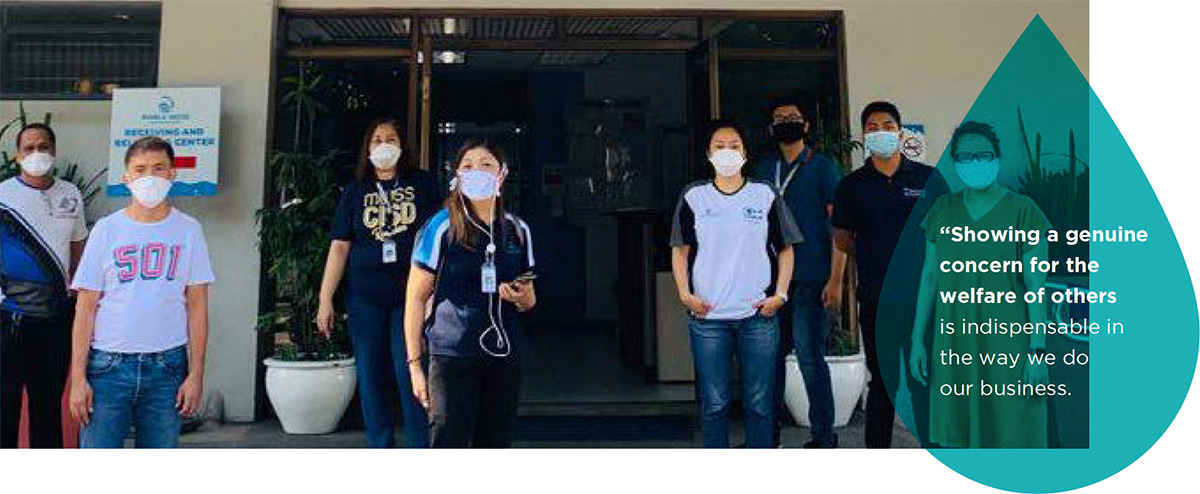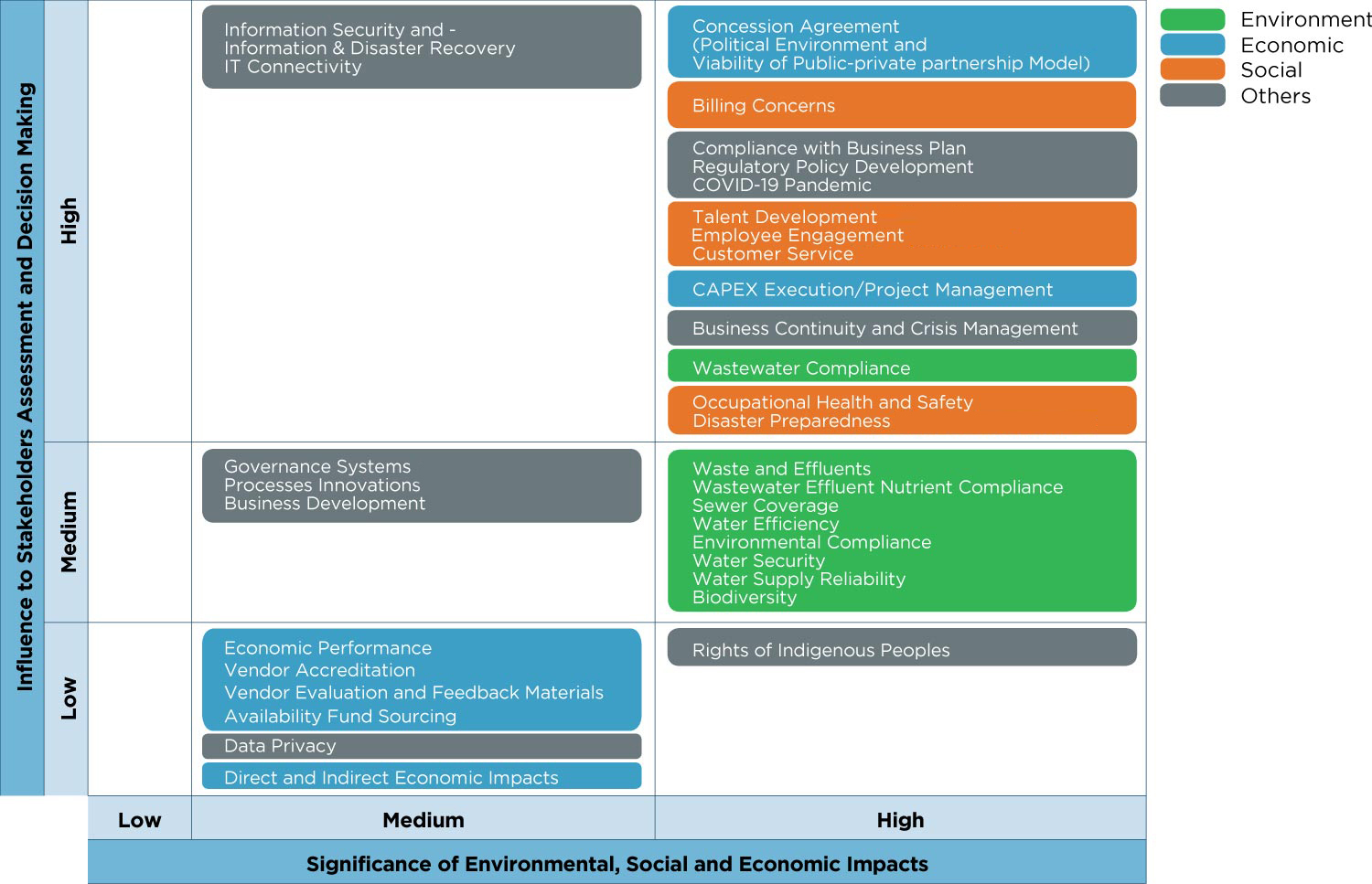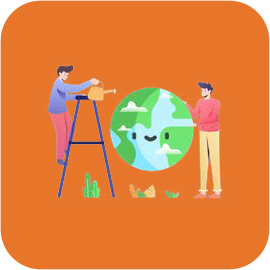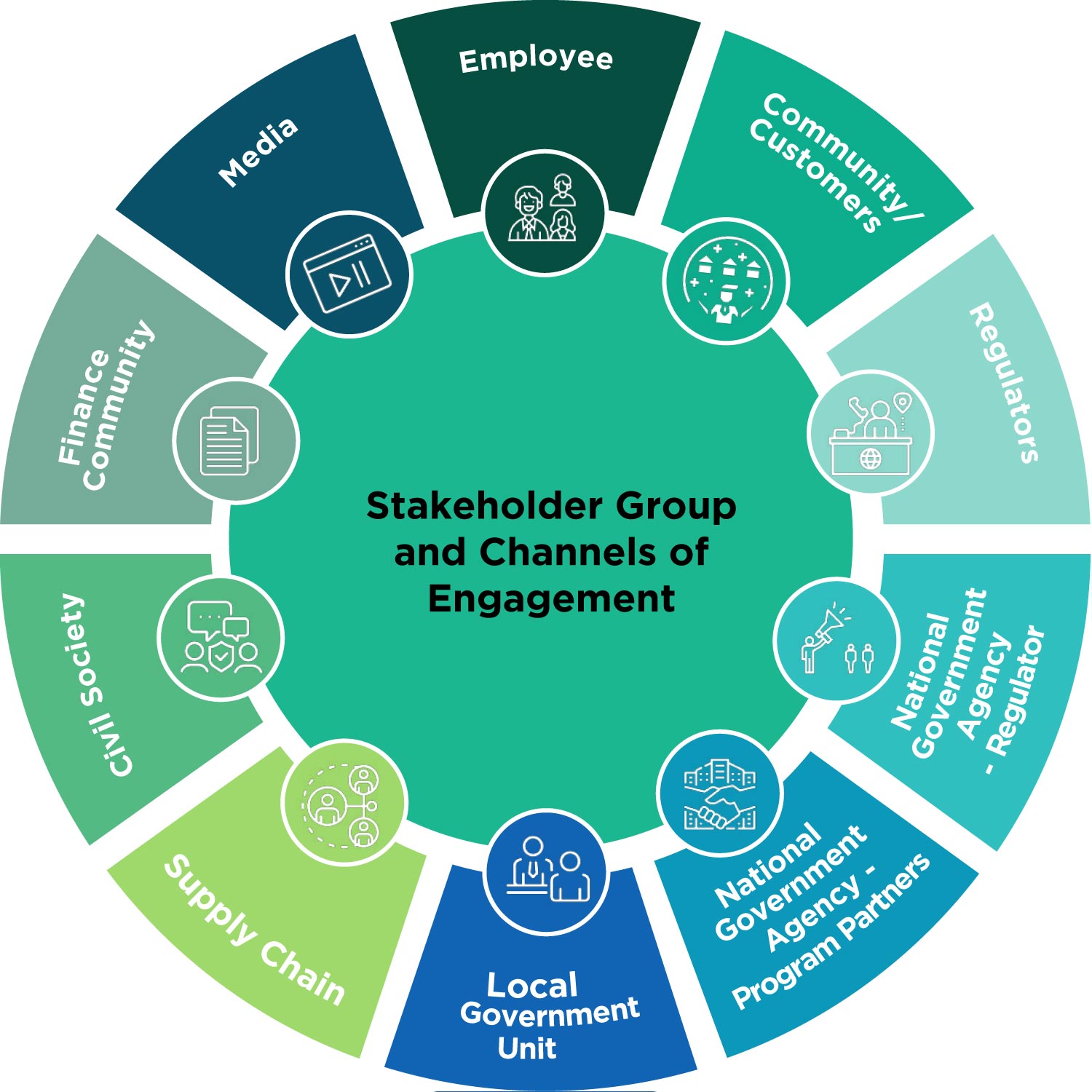|
- Regular meetings at all levels, varying sizes of groups and one-on-ones
- Employee engagement surveys
- Annual performance reviews
- Roadshows
- Email bulletins and online publications
- Townhall meetings
- Kumustahan sessions
|
- Compensation and benefits
- Alignment of personal values with the Company’s mission-vision
- Employee Engagement
- Succession plans
- Availability of training opportunities, internal and external
- Job security
|
- Annual performance-based salary adjustments.
- Updated Manila Water Values, Core and Leadership Competencies.
- Carefully planned and executed COVID-19 Re-entry Reponses which covers the following activities: Work Arrangements, Ensured Safe Workstations, Rapid Testing, Employee Travel Arrangements, Health Monitoring through the SARA app, Employee Toolkit, Employee Care Calls, Daily COVID-19 Bulletins, Employee Survey for monitoring;
- Implemented Total Wellness program under Employee Engagement to promote mental health and provide learnings that can help employees face the challenges of pandemic through Total Wellness Programs, Mahalaga Ka Survey & Quick Win Initiatives and Professional Friends.
- Utilized online learning platforms for Manila Water University and Percipio courses to increase employees’ opportunities for learning. Successors Specific Trainings was also conducted.
- Monitoring the progress of individual development plan of identified successors.
|
|
- Regular coordination meetings with community kasanggas (partners) and benchmark customers
- Public consultations
- Distribution of flyers and bill inserts
- Toka Toka Advocacy and Lakbayan programs
- Communication channels such as the customer service hotline, SMS bill inquiry, email, Manila Water app, official Facebook and Twitter accounts
|
- Water Supply
- Billing inquiries, e.g. excessive billing
- Service disconnection and reconnection
- Water service reliability, esp. during interruptions
- Water availability, esp. during summer
- Water quality
- Wastewater
- Desludging
- Sewer and environmental charges
- Others
- Project-related disruption
|
- Resolving complaints within internal service level targets
- Direct coordination with customers
- Updates to kasanggas (partners)
- Regular posting of planned/unplanned activities to social media
- Posting of barangays scheduled for desludging to social media
- Immediate response to social media
- Regular project updates to community leaders
|
Regulators (e.g. MWSS, CDC, TIEZA)
- Regular correspondence and submission of reports
- Meetings with regulatory offices/ ‘Kumustahan’ sessions
- Public consultations, seminars, conferences and fora
- Tariff adjustments
|
- Monitoring compliance with approved business plan
- Concession Agreement renewal
- Extraordinary Tariff Adjustments approval
- New water source development
- Alignment on advocacy matters, (I.e., effluent standards, Manila Bay cleanup)
- COVID-19 measures
- UN Global Analysis and Assessment of Sanitation and Drinking Water survey
|
- Participation in various engagements relative to the rate rebasing exercise
- Attended and provided support in online public consultations of MWSS on proposed water source development projects
- Involving other national government agencies on matters of misaligned policies and priorities
- Dialogues concerning critical issues on contractual matters or service delivery
|
National Government Agency - Regulators (DENR, NWRB, LGUs, DOH, LLDA, DOLE, DPWH, MMDA, PCA)
- Regular correspondence, submission of reports, permits and clearances
- Regular briefings and public consultations
- Toka Toka advocacy and Lakbayan
|
- Policy / governance matters
- Operational matters
- Position papers
- Penalty settlement
- New policy issuances in relation to pandemic
|
- Compliance to regulators requirements
- Policy advocacy
- Relationship Management
- Compliance to new reporting and permitting requirements.
|
National Government Agency – Program Partners
- Toka Toka advocacy and Lakbayan programs
- Regular briefings and updates
- Participation in National Government Agencies (NGA) events
|
- Alignment of programs with Key Performance Indicators (KPIs) and Supreme Court Continuing Mandamus
- Water Resource Management
- Public Undertaking and Water Sector Policy
- Rate Rebasing
- Right-of-way issues
- Relocation of pipes affecting proposed projects
- Alignment of infrastructure master plans
|
- Alignment of Information, Education and Communication (IEC), desludging caravan, and other environmental projects
- Position papers and similar documents
- Regular and close coordination on project planning and implementation
- Delivery of requested support and event participation
- Partnership in Toka Toka advocacy program
|
Local Government Units (LGU)
- Regular updates through letters or virtual meetings
- Presentation of Biological Nutrient Removal (BNR) Projects
- Public consultation on new water sources
- Kasangga Day
- Virtual Information, Education and Communication (IEC)
- Participation in LGU events
|
- Water
- Billing inquiries
- Excessive billing
- Reconnection
- Promissory notes
- New water sources
- Wastewater
- Others
|
- Direct coordination with LGUs
- Updates to LGUs
- Regular posting of planned/unplanned activities to social media
- Posting of barangays scheduled for desludging to social media
- Public information
- Project updates
|
|
- Annual forums and trainings
- Annual focus group discussions
- Vendor 360 Degree Feedback
- Performance Issue Letters and Counselling sessions
- Company presentations
- E-mail blasts/bulletins/online publications
|
- Minimum accreditation requirements and schedule
- Project pipeline
- Use of tools such as Ariba and Energy Efficiency Contractor Portal (EPPM).
- No feedback mechanism for vendors
- Performance issues – rating criteria and evaluation results
- No contact information of buyers and/or end-users to whom vendors can present to
|
- Standardized accreditation process across the enterprise with the use of Ariba (Vendor Database for buyers and Virtual Data Room for vendors), partnership with D&B (Financial and Environment and Health Assessment) and internal Technical Evaluators (Technical Capability assessment for suppliers (chemicals, technical materials), contractors, and service providers (maintenance)
- Project pipeline are rolled out during Vendor Forums
- Trainings are held for the use of Ariba and EPPM. One-on-one sessions are done as needed
- While the whistle blowing policy is in place and vendors may raise concerns using the means provided by this, Vendor 360 Degree Feedback provides a structured feedback mechanism on Manila Water processes
- Counselling sessions are done for vendors with performance issues to 1) discuss the issues, 2) analyze root cause, 3) arrest further decline in performance. Performance Ratings and criteria that are rated low are indicated in the Performance Issue Letters
- Vendor Management endorses requests for product presentations to the appropriate buyer and/or endusers
|
|
- As-needed courtesy visit
- Face-to-face meetings
|
- Improvement in the socio-economic conditions of the community
- Project partnership
- Biodiversity and watershed management
- Water availability
|
- Water Access, Sanitation and Hygiene (WASH) Program of Manila Water Foundation
- Partnership with Civil Society Organizations (CSO) to manage watersheds (i.e. World Wild Fund for Ipo Watershed)
- Ground water study and water safety plan (i.e. Laguna Water)
- Rehabilitation of water networks and services
- Engagement of local communities (indigenous peoples and non-indigenous people) in watershed management and protection. (i.e. La Mesa, Ipo, General Nakar, and Upper Marikina)
- Community development initiatives in watersheds in partnership with Maynilad Water Services, Inc. (Maynilad)
|
|
- Annual Integrated Report
- Annual Stockholders’ Meeting
- Quarterly Analysts Briefing
- Website and press releases
- Roadshows and one-on-one meetings
|
- Regulatory environment and related developments
- CAPEX projects implementation and disbursement
- Water supply and water sources
- Approved tariff/s and service improvement plan
- Governance systems and processes
- Business continuity (i.e., pandemic response, disaster response)
- Material updates (i.e., Trident Water transaction, Concession Agreement (CA) Negotiation)
- Controversies
|
- Timely/responsive, transparent and truthful communication to Investors and Stakeholders
|
|
- Regular media coordination
- Bi-annual press briefings and conferences
- Media coverage for special events (signing, sealing, inauguration, among others)
- Regular dispatch of press releases and announcements
- Website and social media posts on prevailing issues and service updates
- Sponsorships of media events and advocacies
- Media engagements and interviews
- Media tours and visits
|
- CAPEX programs and projects
- Sustainability programs and advocacies
- Service improvement plans and programs
- New water sources
- Customer service policies
- Water tariff and adjustments
- New business operations, developments, expansion, acquisitions and disclosures • Business continuity and contingency plans
- Engagement with stakeholders
- Rate Rebasing
- Customer concerns
- Concession Agreement (CA) Review
- Relief operations and assistance during calamities and COVID-19
|
- Press Briefing and media engagements including virtual and online
- Media visits of major projects and facilities
- Invitation to events and public consultations, whether physical or virtual
- Public information on issues and concerns
- Regular seeding of relevant press releases
- Regular interface with local and national media including virtual and online
- Advisories and notices to customers
- Media fora, interviews and press conferences including virtual and online
- Relevant information posted on digital and social media platforms
|














